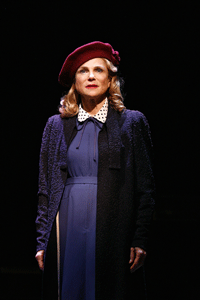During the past few months, as my friends and I discussed this year’s Academy Awards, I frequently expressed my lack of enthusiasm for the Best Picture winner, “Slumdog Millionaire.” While I admitted that it was beautifully filmed and cleverly structured, I could not buy the amazing coincidence that connected every question with a traumatic event in the young man’s life, as well as the similarly incredible escapes from the mortally dangerous circumstances that led him to his beloved. The only rationale for such a tall tale comes in the final shot, which displays the words: “It is written.” Destiny rules.
Then I saw the new Broadway play, “Irena’s Vow.” It tells an equally incredible but true story of a young Polish Catholic woman, Irena Gut Opdyke, who, while forced to work as a housekeeper for a S.S. officer, Major Eduard Rugemer, managed to hide a dozen Jews in the basement of the officer’s house. Her ingenious methods of keeping the people hidden, fed and cared for are especially tested when one of the women in hiding becomes pregnant.
While several refugees urge the woman to abort the child for their own safety, Irena reveals that, after she had stood by helplessly watching Nazi soldiers brutally slaughter dozens of men, women, and children, she vowed that she would save any life whenever she had the power to do so. And so, during the baby’s delivery, Irena drowns out the mother’s screams by blasting a recording of Wagner’s music on the major’s phonograph. She finds similar ways of keeping the child’s cries from being heard upstairs. he near-discoveries and the various ruses to keep the Jews’ presence a secret for two years, as Irena herself admits to the audience, “would be farcical if they weren’t about life and death.”
The playwright, Dan Gordon, whom I recently interviewed, is convinced of the presence of a “divine hand” in the narrative, a design or a plan that matches the “Slumdog” belief in what is “written.” Gordon has evidence to support his theory. While the play ends with Irena’s and her Jewish friends’ release when the Russians drive the Germans out of their town, the subsequent twists in her fortunes only heighten the sense of destiny that shaped the rest of Irena’s days. As the Germans were driven out, Irena was arrested by the Russians as a partisan and sentenced to a labor camp in Siberia.
However, the very Jews who had hid in her basement managed to smuggle her out of the local prison camp. A United Nations High Commissioner, visiting the camp, heard her story and arranged her transfer to the United States, where she worked in New York City for several years. By another sheer coincidence, Irena and the U.N. official met a few years later in New York, married and moved to Southern California, where she spent the rest of her life until her death in 2003. Her name now appears next to Oskar Schindler’s on the wall in Jerusalem that honors the “Righteous Among the Nations,” the title given to Gentiles who risked their lives to aid and save Jews during the Holocaust.
Gordon, whose credits include the screenplays for “The Hurricane” and “Wyatt Earp,” the stage adaptations of “Rain Man” and “Terms of Endearment,” as well as several novels, was captivated by Irena’s story when, by happy coincidence, he heard her being interviewed on his car radio almost ten years ago. When he met Irena, he found her to be “totally at peace with herself, wise, and even fun” with a “pixie-ish” sense of humor. He discovered that she avoided bitterness about the past and had, in fact, never talked about her experiences for almost 30 years. Only when she answered the telephone one day from a high school student doing a survey questioning whether the Holocaust had really happened that she decided that it was time to tell her story, especially to children, to whom she felt a special responsibility.
The current production, which had a successful run last year Off-Broadway, stars the award-winning actress Tovah Feldshuh, who first appears onstage as the 80-year-old Irena telling her story to a group of high school students. After a few minutes, she is transformed into a 20-year-old in the service of Major Rugemer (Thomas Ryan). Throughout the rest of the play’s 90 minutes she interacts with her employer, other Nazi officers, and her Jewish charges, with an occasional address or side-remark to the audience, never leaving the stage as her character careens from crisis to crisis in a battle of wits and physical daring.
Gordon describes Ms. Feldshuh as “a force of nature” in her portrayal of a woman who refuses to lose hope throughout one of the most horrible events in history. Thomas Ryan presents Major Rugemer as a mixture of Germanic discipline and the all-too-human loneliness that accompanies an authoritarian existence. The rest of the characters in the play, unfortunately, tend to fall into the stereotypes of the Jewish victims or the Nazi masochists, thus paling in comparison with the rich characterization of Irena and the major.
At the end of the performance I attended, the audience offered a prolonged standing ovation. I suspect that this play will live on well beyond Broadway in the film version that is being considered, as well as in many regional theaters around the country. As an historical record of the horrors of the Nazi regime, it joins the stories of Anne Frank, Oskar Schindler, Elie Wiesel, and others. As a testimony to the power of the human spirit and, indeed, of spirituality itself, it delivers a timeless message.








